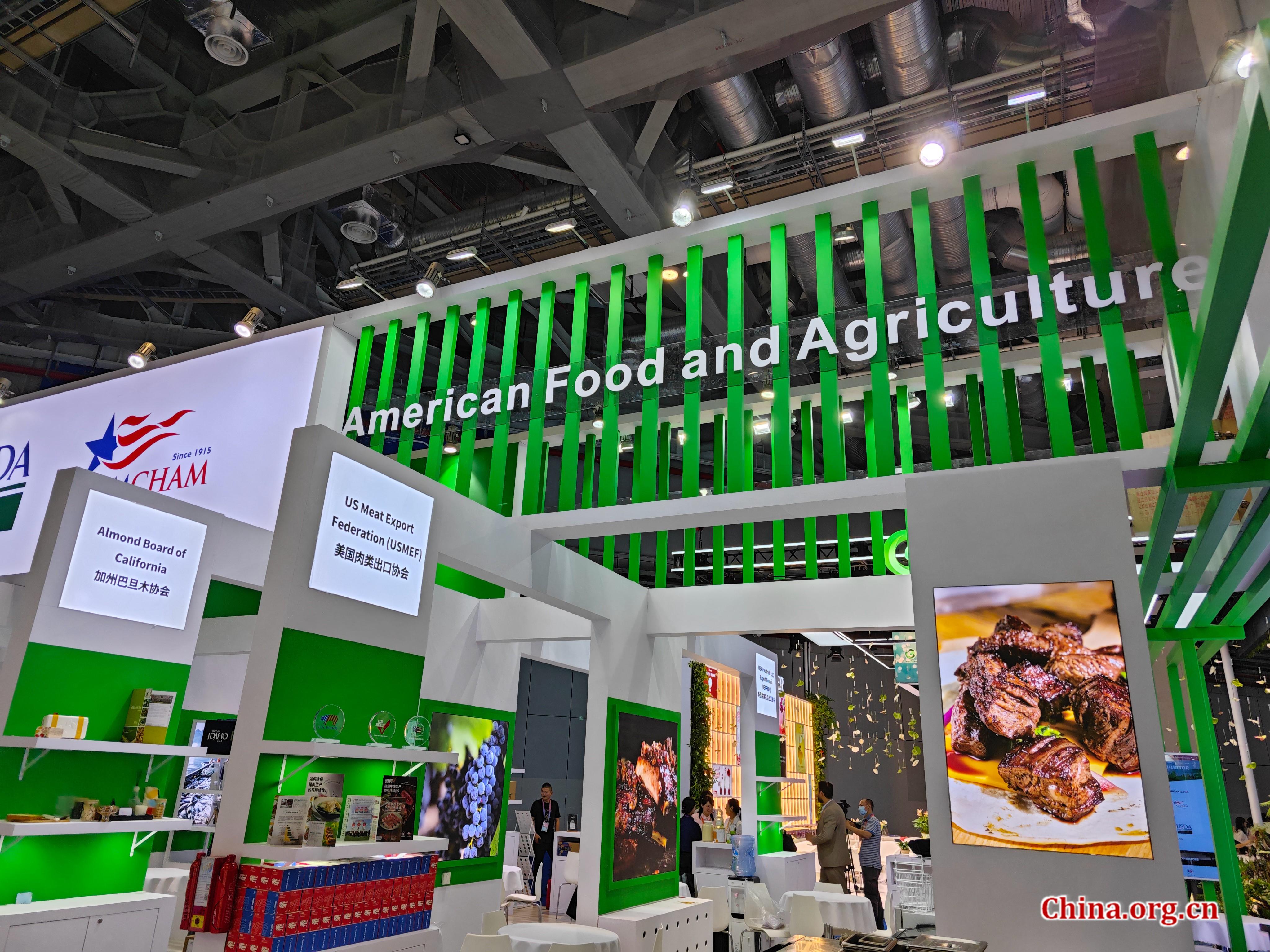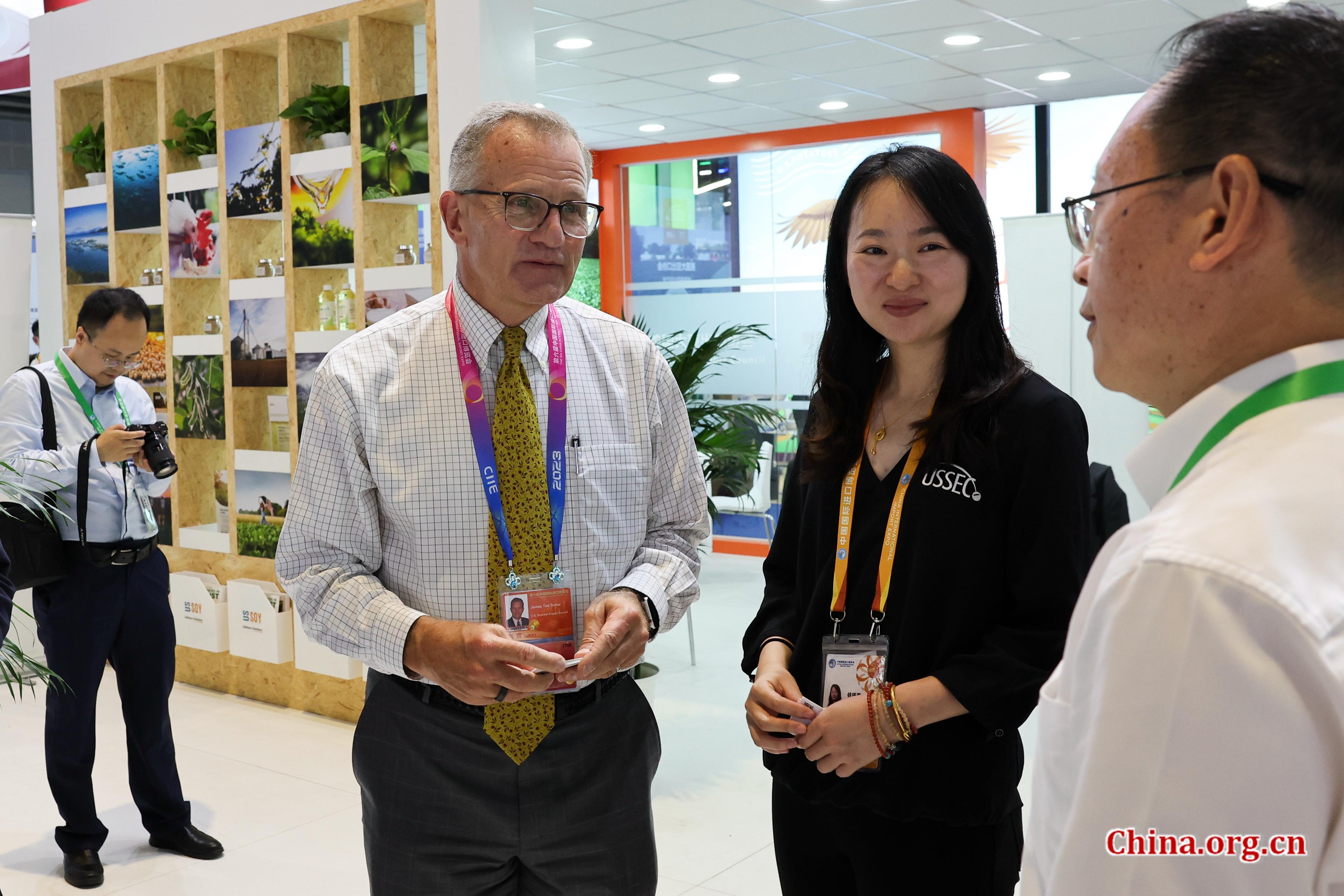US seeks stronger ties at 6th CIIE with official pavilion
- ?By Wang Yiming
 0 Comment(s)
0 Comment(s) Print
Print E-mail China.org.cn, November 6, 2023
E-mail China.org.cn, November 6, 2023
With the 6th China International Import Expo (CIIE) currently underway from Nov. 5-10, a noteworthy development has been capturing attention — the debut of the American Food and Agriculture Pavilion. This venture, co-hosted by AmCham Shanghai and the U.S. Department of Agriculture (USDA), marks a significant shift in U.S. presence at the CIIE. Unlike previous years where the United States was represented by individual enterprises and non-governmental organizations, this year sees an official delegation and consolidated American presence.
Covering more than 200 square meters, the pavilion features 17 exhibitors, highlighting an assortment of American agricultural products, from meats and almonds to wines and health supplements.

The American Food and Agriculture Pavilion at the 6th China International Import Expo, Shanghai, Nov. 5, 2023. [Photo by Wang Yiming/China.org.cn]
"It sends a message that the U.S. wants to improve their relations with China," said Jim Sutter, CEO of the U.S. Soybean Export Council.
For the U.S. Soybean Export Council, the CIIE is familiar territory. Participating in its sixth year, the council regards the expo as a pivotal platform for engaging with their customers. With the ever-evolving soybean industry characterized by its technological and innovative shifts, Sutter said the expo is seen as an invaluable avenue for dialogue and discussion.

Jim Sutter (L2), CEO of the U.S. Soybean Export Council, talks with participants at the 6th China International Import Expo, Shanghai, Nov. 5, 2023. [Photo by Dong Ning/China.org.cn]
"I'm very happy that our other agriculture partners are here. We just participated in a delegation of 11 different commodity groups that have come here to China from the United States. We had meetings in Beijing last week. We're now here all participating at the CIIE," he said.
Reflecting on the challenges of recent years, Sutter said, "We've been through a lot over the last few years, the whole COVID situation, which came just after the trade war." He continued, "But I think in the last few months, we've seen those tensions thawing out, getting better. I think having the USDA booth here is just another example of the relationship that the U.S. wants to build and strengthen with China."
Underscoring the importance of the CIIE, he explained that it is an important gathering for those in the soybean trade. "Whether they are Chinese companies — importers, livestock producers, food producers — or international firms doing business with China, this is a spot for them all to meet," he stressed.
Among the exhibitors at the official American pavilion at the CIIE is the state of Georgia. With the Georgia Department of Economic Development as the leading state agency for drawing new business investment, the state is a significant player in U.S. trade, positioned seventh nationally. Notably, China is Georgia's top trade and export partner.
Herminio Andres Alija, managing director of trade for the state of Georgia, is in charge of the state's participation. He has introduced several companies at the expo, emphasizing agricultural products such as sauces, condiments and muscadine products. In particular, he mentioned, "These are only small samples of many companies that in Georgia want to trade with China."

Herminio Andres Alija, managing director of trade for the state of Georgia, introduces the companies at the American Food and Agriculture Pavilion of the 6th China International Import Expo, Shanghai, Nov. 5, 2023. [Photo by Tong Mingyue/China.org.cn]
Regarding the CIIE's significance, Alija noted, "We believe that this is one of the largest shows where China is showing to the world, that they are not only the manufacturing half of the world, but they are also a big market. And with that, what we are doing is connecting countries through the trade."
On the message that this official U.S. participation sends, Alija said, "I believe that more and more American companies should be coming here to make the American people know that Chinese are our friends, then we can cooperate in many things around everything."
Echoing a similar sentiment, Jim Sutter said, "I think what we really need is to focus on international trade, business relationships and really working together across China, U.S., but across many other countries as well. Because if we focus on working together and creating better lives for all of our people, then hopefully the conflicts will go away and we'll all be much better off."





